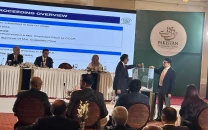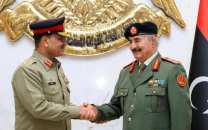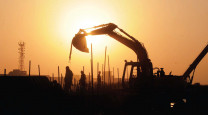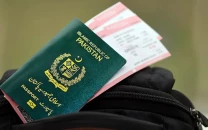TTP and the breach of pact
Part of agreement was assurance that Afghanistan won't allow terrorists to use its soil to attack a foreign country

The attack on Pakistan’s security forces checkposts in Chitral on September 6 came as a crude reminder about the relationship between Afghanistan and Pakistan coming to a new low. Though there is a complete denial from the Afghan government on providing TTP a free hand to conduct an attack on Pakistan from Afghan soil, the ease of carrying out the incursion, the modern weapons used in the carnage and the ferocity of the attack all point fingers to the tacit approval of the Afghan government to the TTP’s nefarious designs on Pakistan.
Part of the agreement that formed the Doha Pact was an assurance to the international community, including Pakistan, that Afghanistan would not allow any terrorist group to use its soil to attack a foreign country. Pakistan’s relations with the Taliban government have soured to a large extent because of the Afghan government support to TTP and also the reason that the Taliban revoked their commitment to honour Pakistan’s sovereignty by forever laying to rest the Durand Line issue. That was not to be. There were a number of attacks on the fences erected along the Pak-Afghan border to manifest the deep-seated ire the Afghans still hold against the Durand line that, according to them, had drawn a line between the Pashtuns of both countries.
TTP is a militant organisation fighting against the state of Pakistan since 2007. The group was formed from the splintered elements of Al-Qaeda and other militant factions pursuing the goal of enforcing Sharia in Afghanistan and, by extension, Pakistan. That the group restored to arms conflict, killing thousands of innocent people, including children at the heinous attack at the Army Public School in Peshawar in December 2014, is evident that religion has been a ploy that the group used to destabilise Pakistan at the behest of the country’s regional foes, especially India. Since 2018, the group has diverted its policy from attacking civilians to Pakistani military personnel and intelligence operatives to avenge the Pakistan military’s operation in North Waziristan that completely dismantled the TTP’s critical infrastructure. On the other hand, Pakistan’s action against terror financing had choked the group’s monetary supply line, rendering it ineffective until the Afghan Taliban returned to power.
The Chitral attack is part of the elaborated cross-border incursions that the TTP has intensified since the departure of the US from Afghanistan. There were reports also of militants crossing over to Kalash Valley. The attacks were led by TTP head Noor Mehsud, whereas the timing of the attack was also well-calculated as the country was celebrating Defence Day on September 6.
Despite their number and advanced weaponry, the Pakistan military forces forced the intruders out after three days of fierce fighting in which the local people actively participated. Though the situation has become normal, some districts are still recovering.
The TTP is active in Khyber-Pakhtunkhwa and has extended its operations to the Balochistan province. The sectarian tension in Gilgit-Baltistan is said to have emboldened the TTP to spread its tentacles to Chitral.
By 2016, Pakistan had successfully broken the back of the TTP, and the incidents of terrorism had gone considerably down. The attack on the rank and file of the militant group had splintered them into various factions, resulting in difficulty in amassing power that originates from a consolidated group formation. That, however, changed with the arrival of the Taliban government in 2021. Another troubling factor that helped the splintered TTP converge was Pakistan’s decision to release many Taliban from its prisoners as a goodwill gesture to enable the Afghan government to find roots in the newly formed governance structure. Pakistan even agreed to strike a ceasefire with the TTP on the insistence of the Afghan government with a guarantee that things would return to normal. The peace talks went nowhere. Instead, the calming period allowed the TTP to regroup and return stronger.
The Afghan government has accused Pakistan of leveling unfounded blame on the Afghan Taliban for supporting the TTP. This denial was refuted in the report published on Afghanistan by the UNSC’s Analytical Support and Sanctions Monitoring Team on June 9.
“There are indications … that TTP is launching attacks into Pakistan with support from the Taliban, that groups of foreign terrorist fighters are projecting threat across Afghanistan’s borders,” said the report, adding, “A range of terrorist groups have greater freedom of maneuver under the Taliban de facto authorities. They are making good use of this, and the threat of terrorism is rising in both Afghanistan and the region.”
The report has also rebuffed the Afghan government’s claim of not allowing its territory to be used by foreign terror groups. “Taliban harbouring and supporting TTP evidences a threat projecting beyond the borders of Afghanistan and negates the group’s numerous assertions that Afghanistan’s soil will not be used for carrying out attacks against other countries.”
About the relationship between Al-Qaeda, the TTP, and the Afghan Taliban, the report noted: “The relationship between the Afghan Taliban and TTP, like the Taliban’s relationship with Al Qaeda, is tightly bonded and unlikely to dissipate.” Additionally, “The Taliban does not consider TTP a threat to Afghanistan, but rather as part of the emirate.”
The TTP training camps in the Kunar, Nangarhar, Logar, Paktika, Paktia and Khost where, according to the report, some 4,000 to 6,000 TTP fighters are trained, cannot operate without the express consent and support of the Afghan Taliban. “The link between the Taliban and Al-Qaeda and Tehrik-e-Taliban Pakistan (TTP) remains strong and symbiotic.”
Pakistan, one of the frontline states in the war on terrorism, has played a crucial role in eliminating the spectre of global terrorism. By that account, the international community is expected to influence the Afghan government to fulfil its commitment to not letting Afghan soil be used against any country.
Published in The Express Tribune, September 14th, 2023.
Like Opinion & Editorial on Facebook, follow @ETOpEd on Twitter to receive all updates on all our daily pieces.

















COMMENTS
Comments are moderated and generally will be posted if they are on-topic and not abusive.
For more information, please see our Comments FAQ